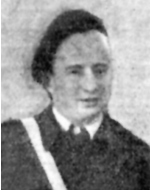Yitzhak, son of Ryshel-Zissel and Elhanan-Binyamin (Chuna), was born in Lodz in 1925 to the north-west of Warsaw, where he began working in his father’s weaving factory. For a while the family moved to the nearby town of Constantine, where they lived among Germans, but at the outbreak of World War II they returned to Lodz .With the eve of World War II, about a quarter of a million Jews lived in Lodz, An important Jewish cultural center, a network of Jewish schools was built in the city, great intellectuals worked in it and conducted lively political and public activity The city of Lodz was conquered by the Germans on September 8, 1939, a week after the beginning of the war, and annexed to the German Reich, followed by brutal persecutions of Jews, abductions of slave labor and abuse. A Ghetto was established in Lodz, where some 200,000 men, women and children were concentrated in inhuman conditions, and the Jews of the ghetto were exploited as cheap laborers and forced to work in production plants for the Germans. During 1942, some 80,000 Jews were deported to the Chelmno camp, where most of them were murdered. Until the spring of 1944, almost all of the Jews of the Lodz ghetto were deported to extermination. The latter were deported to the Auschwitz death camp. All of Yitzhak’s family members were murdered in the camps. Only he managed to survive the Auschwitz-Birkenau camps alive and reached the day of liberation. At the end of the war he set out on the escape route to the DP camps in Germany and Italy. From Germany he contacted his mother’s relatives in America, who sent him all the necessary documents so that he could travel to them, but Yitzhak gave up and preferred to immigrate to Eretz Israel. Yitzhak succeeded in immigrating to Israel in 1947 without being caught by the British, settled in the center of the country and found work in the weaving profession, a field in which he specialized in Bnei Brak. With the outbreak of the War of Independence, Yitzhak was joined to the 33rd Battalion of the Alexandroni Brigade, the 3rd Brigade in the Haganah. From the beginning of the war, the brigade’s fighters defended the settlements in the Sharon area and secured the Jewish transport routes on the Tel Aviv-Haifa highway. They repulsed attacks on settlements, detonated bridges, retaliated against Arab transport, and captured enemy bases and British military installations that had been vacated upon the termination of the Mandate. On the eve of the establishment of the state, Yitzhak participated in a “state” operation to conquer Arab Kfar Saba. Arab Kfar Saba was a large Arab village east of the Jewish village of Kfar Sava, and its residents have been harassing their Jewish neighbors since the beginning of the war. With the approaching date of the declaration of the state and the expected invasion of the Arab armies, there was a growing fear that the village would serve as a forward base for them and for the forces of the Arab “Salvation Army”. The mission was assigned to the Alexandroni fighters. Due to the proximity to the date of the Declaration of Independence of the State of Israel, the operation was called “Medina”. On May 13, 1948, the Israeli fighters stormed and conquered the village, but the Arabs launched a counter-attack with the help of armored personnel carriers. A fierce battle also took place near the blockades set up by the brigade, between Arab Kfar Saba and Qalqiliya. More than ten “Alexandroni” fighters fell on the same day, but the operation was successful and on the day of the establishment of the State, the entire area west of Qalqiliya was in the hands of the Hagana forces. On the day of the battle in Arab Kfar Saba, Yitzhak was badly injured. He was transferred to Beilinson Hospital, but the doctors’ efforts to save him were unsuccessful and the next day, May 14, 1948, he died of his wounds.Heck. This hero is a “last scion”. The survivors of the Holocaust are survivors of the Holocaust who survived the last remnant of their nuclear family (parents, brothers, sisters, sons and daughters) who experienced the Holocaust in the ghettos and / or concentration camps and / or in hiding and hiding in territories occupied by the Nazis and / Or in combat alongside members of the underground movements or partisans in the Nazi-occupied territories who immigrated to Israel during or after World War II, wore uniforms and fell in the Israeli army.
